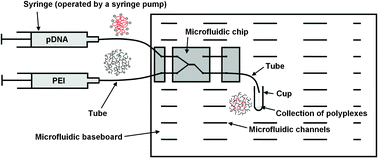 Researchers at Philipps-Universität Marburg, Germany, have developed a new technique for the production of polyplexes that produces more regular sized complexes compared to the standard pipetting methods. Polyplexes are the complexes that form by electrostatic interactions of oppositely charged macromolecules – in this case poly(ethylene imine) (PEI) and plasmid DNA, which are used in gene therapy applications.
Researchers at Philipps-Universität Marburg, Germany, have developed a new technique for the production of polyplexes that produces more regular sized complexes compared to the standard pipetting methods. Polyplexes are the complexes that form by electrostatic interactions of oppositely charged macromolecules – in this case poly(ethylene imine) (PEI) and plasmid DNA, which are used in gene therapy applications.
The group, led by Thomas Kissel, developed a method that produces the complexes using microfluidics on a chip. Over the course of the study, they investigated the factors that could affect the complex size, and discovered that the most important factor was the ratio of PEI to DNA, whilst other factors were not as important. Using the chip method, regular sized complexes (140 nm and 160 nm) were produced, compared to the more irregular pipetting method. The team also showed that different (targeted) PEI-based vectors could be used for the formation of complexes with pDNA and siRNA.
Read the details of the study here:
Optimized preparation of pDNA/poly(ethylene imine) polyplexes using a microfluidic system
Heiko Debus, Moritz Beck-Broichsitter and Thomas Kissel
DOI: 10.1039/C2LC40176B
This HOT article is free to access for the next four weeks following a simple registration for individual users.










